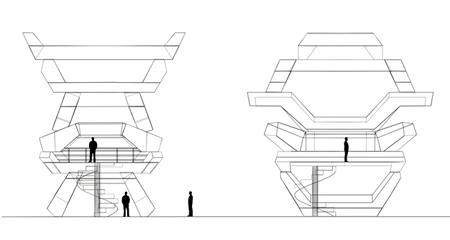
Contemporary Pagoda by Daniel Simmons
Toronto-based designer Daniel Simmons has designed a conceptual shrine for meditation called Contemporary Pagoda.

According to Simmons, the structure is intended as "a contemporary ruin - a structure that is raw form only; open to all; no heating, cooling or lighting systems, not conventionally habitable, but pursuing an interior space for meditation and contemplation."

The following text is from Simmons:
--
The work of this studio envisions a contemporary ruin - a new kind of open meditation building which recalls the ornate tombs, funerary structures, shrines, temples, pagodas and Japanese mountain gates of the East - yet attempts a contemporary brand of ornamentation.
In recalling the architectural ruins of antiquity, one observes how decay has altered those structures' relationship to the landscape, and consequently their visitors' experience. In envisioning a contemporary ruin, this work similarly seeks for visitors to experience the interplay of the built form with natural forces - but actively because of its design, not in becoming a relic.
These works don't seek to create a hard division against the forces of nature, but rather to frame and modulate inward-pushing elemental currents. Like the decayed ruin, these structures also become sunken into the landscape.
The work is also informed by the fact that the historical legacy of architecture given to contemplation, meditation, prayer, themes of transcendence and impermanence, with an enlightened relationship to the natural world - lies mostly outside the North American context.
Studio projects therefore propose the entry, so to speak, of a meditative architectural program in our Western, modern setting, using a contemporary design sensibility.